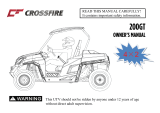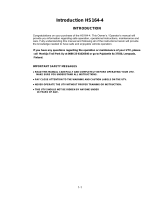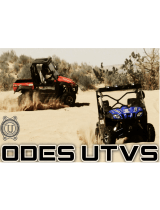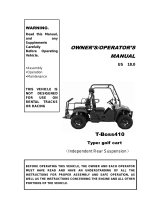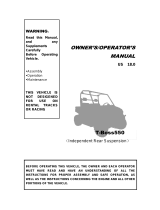Page is loading ...


Read, understand, and follow all of the instructions and safety
precautions in this manual and on all product labels. Failure to
follow the safety precautions could result in serious injury or
death.
The engine exhaust gas from this product contains CO, which
is deadly gas and could cause headaches, giddy, or lose
consciousness, even death.
A card containing important UTV safety information should be attached to the owner's manual on
the next page. If you cannot locate this card or if it has been removed, please contact your dealer.
-1-

INTRODUCTION
Thank you for purchasing a CFMOTO vehicle, and welcome to join our worldwide family of CFMOTO
owners.
We proudly produce an exciting line of utility and recreational products.
All terrain vehicle (UTV)
Utility vehicle (patrol, forest protecting and hunting)
Motorcycles and scooters
CFMOTO, a company which is specialized in production of liquid-cooled engine, is the top-level
supplier in China. Compared to same displacement of air- cooled engine, engine cooling effect is
better, oil temperature can be adjusted more freely, more powerful and lower fuel consumption,
longer engine working life.
For safe and enjoyable operation of your vehicle, be sure to follow the instructions and recomme-
ndations in this owner's manual. Your manual contains instructions for minor maintenance. Infor-
mation about major repairs are outlined in the CFMOTO service manual, and should be performed
only by CFMOTO service dealer and technician.
Your CFMOTO dealer knows your vehicle best and is interested in your total satisfaction. Be sure
to return to your dealership for all of your service.
●
●
●
Due to constant improvements in the design and quality of production components, some
minor discrepancies may result between the actual vehicle and the information presented in
this publication. Depictions and/or procedures in this publication are intended for reference
use only.
-2-

VIN No.………… ……… …………… ……… …………… ……… …… ……… ………
4
5
………………………………………………………………………………
Features and Controls………………………………………………………………………… 46
Operation………………………………………………………………………………………
64
…………………………………………………………… 87
………………………………………………………………
132
………………………………………………………………………………
140
………………………………………………………………………………
149
………………………………………………………………………………
152
…
…
…
…
…
…
…
TABLE OF CONTENTS
Operator safety
Maintenance & Lubrication
…
Clean & Storage
Troubleshooting
Specifications
Wiring diagram
…………
…
…
…
-3-

Vehicle Identification Number:
Engine Serial Number:
①
②
VEHICLE IDENTIFICATION NUMBER
Record your vehicle's identification number and engine serial number in the spaces provided,
remove "ignition” key and store it in a safe place for duplicating spare key if keys are lost, otherwise
ignition key can only be replaced.
Vehicle model number:
-4-

OPERATOR SAFETY
Failure to heed the warnings contained in this manual can result in serious injury or death. An UTV
is not a toy and can be hazardous to operate. This vehicle handles differently from other vehicles,
such as motorcycles and cars.
Read this owner's manual. Understand all safety warnings, precautions, and operating procedures
before operating an UTV.
A collision or rollover can occur quickly, even during routine maneuvers, like turning, or over
obstacles, if you fail to take proper precautions.
AGE RESTRICTIONS
This vehicle is an ADULT VEHICLE ONLY. Operation is prohibited for anyone under the age of 16.
KNOW YOUR VEHICLE
As the operator of the vehicle, you are responsible for your personal safety, the safety of others,
and the protection of our environment. Read and understand your owner's manual, which includes
valuable information about all aspects of your vehicle, including safe operating procedures.
-5-

OPERATOR SAFETY
SAFETY TRAINING
When you purchased your new UTV, your dealer offered a hands-on safety-training course that
covers all aspects of vehicle safety. You were also provided with printed materials that explain safe
operating procedures. You should review this information on a regular basis. If you purchased a
used UTV from a party other than a dealer, you can request this free safety training from any
authorized dealer.
Familiarize yourself with all laws and regulations concerning the operation of this vehicle in your area.
We strongly advise you to strictly follow the recommended maintenance program outlined in your
owner's manual. This preventive maintenance program is designed to ensure that all critical
components on your vehicle are thoroughly inspected at specific intervals. The following signal
words and symbols appear throughout this manual and on your UTV. Your safety is involved when
these words and symbols are used. Become familiar with their meanings before reading the manual.
The safety alert symbol below indicates a potential personal injury hazard or death and or damge to
the vehicle.
-6-

OPERATOR SAFETY
CAUTION
A caution indicates a situation that may result in damage to the vehicle.
CAUTION
A note will alert you to important information or instructions.
Serious injury or death can result if you don't follow these instructions and procedures, which are
outlined in further detail within your owner's manual.
Read this manual and all labels carefully, and follow the operating procedures described.
Never operate an UTV without proper instruction. Take a training course. Beginners should
receive training from a certified instructor. Contact an authorized UTV dealer to find out about the
training courses nearest you.
Never allow anyone under 16 years of age to operate this UTV.
Never carry a passenger under age 12. Make sure any passenger is tall enough to comfortably
and safely reach the hand holds and place both feet on the floor.
Never permit a guest to operate the UTV unless the guest has read this manual and all product
labels and has completed a certified safety-training course.
Never operate an UTV without wearing an approved helmet that fits properly. Always wear eye
protection (goggles or face shield), gloves, boots, a long- sleeved shirt or jacket, and long pants.
Never consume alcohol or drugs before or while operating an UTV.
●
●
●
●
●
●
-7-

OPERATOR SAFETY
Never operate at excessive speeds. Travel at speeds appropriate for the terrain, visibility and
operating conditions, and your experience.
Always keep hands and feet inside vehicle.
Always inspect your UTV before each use to make sure it is in safe operating condition.
Always follow the inspection and maintenance procedures and schedules outlined in your owner's
manual.
Never allow a passenger to ride in the cargo box. Never carry more than one passenger.
Always travel slowly and use extra caution when operating on unfamiliar terrain.
Be alert to changing terrain conditions.
Never operate on excessively rough, slippery, or loose terrain.
Always follow proper turning procedures as described in this manual. Practice turning your UTV
at low speeds, before attempting to turn at faster speeds. Do not turn at excessive speeds.
Always have the UTV inspected by an authorized dealer if it's been involved in an accident.
Never operate on hills too steep for the UTV or for your abilities. Practice on smaller hills before
attempting larger hills.
Always follow proper procedures for climbing hills. Check the terrain carefully before ascending a
hill.
Never climb hills with excessively slippery or loose surfaces. Shift your weight forward.
Never open the throttle suddenly or make sudden gear changes. Never go over the top of a hill at
high speed.
●
●
●
●
●
●
●
●
●
●
●
●
●
●
-8-

OPERATOR SAFETY
Always follow proper procedures for going downhill and for braking on hills. Check the terrain
carefully before you start down a hill. Shift your weight backward.
Never go down a hill at high speed.
Avoid going down a hill at an angle, which would cause the vehicle to lean sharply to one side. Travel
straight down the hill when possible.
Always follow proper procedures for crossing the side of a hill. Avoid hills with excessively slippery
or loose surfaces. Shift your weight to the uphill side of the UTV. Never attempt to turn the UTV
around on any hill until you' have mastered (on level ground) the turning technique outlined in this
manual.
Avoid crossing the side of a steep hill when possible.
Always use proper procedures if you stall or roll backwards while climbing a hill. To avoid stalling,
maintain a steady speed when climbing a hill. If you stall or roll backwards, follow the special
procedure for braking described in this manual.
Always dismount on the uphill side, or to either side if the UTV is pointed straight uphill. Turn the
UTV around and remount following the procedure described in this manual.
Always check for obstacles before operating in a new area. Never attempt to operate over large
obstacles, such as rocks or fallen trees. Always follow proper procedures when operating over
obstacles as described in this manual.
Always be careful of skidding or sliding. On slippery surfaces like ice, travel slowly and use extra
caution to reduce the chance of skidding or sliding out of control.
●
●
●
●
●
●
●
●
●
-9-

OPERATOR SAFETY
Avoid operating the UTV through deep or fast-flowing water. If it is unavoidable, travel slowly,
balance your weight carefully, avoid sudden movements, and maintain a slow and steady forward
motion.
Do not make sudden turns or stops, and do not make sudden throttle changes.
Wet brakes may have reduced stopping ability. Test your brakes after leaving water. If necessary,
apply them lightly several times to allow friction to dry out the pads.
Always check for obstacles or people behind the UTV before operating in reverse. When it s safe
to proceed in reverse, move slowly and avoid turning at sharp angles.
Always use the size and type of tires specified for your UTV, and always maintain proper tire
pressure.
Never modify an UTV through improper installation or use of accessories.
Never exceed the stated load capacity for your UTV. Cargo must be properly distributed and
securely attached. Reduce speed and follow the instructions in this manual for carrying cargo or
towing. Allow a greater distance for braking.
Always remove the ignition key when the vehicle is not in use to prevent unauthorized use or
accidental starting.
Riders should wear seat belts at all times. Seat belts reduce the severity of injury in the event of
sudden stop or accident.
Never touch running parts, such as wheels, drive shaft, etc.
●
●
●
●
●
●
●
●
●
●
-10-

OPERATOR SAFETY
Always keep both hands on the steering wheel during operation. A passenger should always be
seated in the passenger seat with both feet on the floor and both hands firmly grasping securely the
hand holds.
This vehicle handles differently than cars, trucks or other off-road vehicles. Turning improperly can
result in an overturn. Avoid sharp turns. Never turn while applying heavy throttle. Never make abrupt
steering maneuvers. Operate at speeds appropriate for your skills, the conditions, and terrain. Do
not do power slides, “donuts”, jumps or other driving stunts.
Always turn off the engine before refueling. Make sure the refueling area is well ventilated and free
of any source of flame or sparks. Gasoline is extremely flammable. See page 29 for fuel safety
warnings. Remove flammable material containers from the box before filling.
FOR MORE INFORMATION ABOUT UTV SAFETY, PLEASE CONTACT WITH YOUR DEALER.
-11-

OPERATOR SAFETY
EQUIPMENT MODIFICATIONS
We are concerned with the safety of our customers and for the public. Therefore, we strongly
recommend that consumers do not install on an UTV any equipment that may increase the speed or
power of the vehicle, or make any other modifications to the vehicle for these purposes. Any
modifications to the original equipment of the vehicle create a substantial safety hazard and increase
the risk of body injury. The warranty on your UTV is terminated if any equipment has been added to
the vehicle, or if any modifications have been made to the vehicle, that increases its speed or power.
NOTE
The addition of certain accessories, including (but not limited to) mowers, blades, tires, sprayers, or
large racks, may change the handling characteristics of the vehicle. Use only approved accessories
and familiarizes yourself, with their function, and effect on the vehicle.
-12-

OPERATOR SAFETY
POTENTIAL HAZARD
Operating this vehicle without proper instruction.
WHAT CAN HAPPEN
Loss of control and accident resulting in serious injury or death.
HOW TO AVOID THE HAZARD
The risk of an accident is greatly increased if the operator does not know
how to operate the vehicle properly in different situations and on different
types of terrain.
All operators must read and understand the owner's manual and all warning and instruction labels
before operating the vehicle.
POTENTIAL HAZARD
Turning improperly
WHAT CAN HAPPEN
HOW TO AVOID THE HAZARD
Avoid sharp turns. Never turn while applying heavy throttle. Never make abrupt steering maneuvers.
Operate at speeds appropriate for your skills, the conditions, and the terrain. DO NOT do power
slides, “donuts”, jumps or other driving stunts. Practice turning at slow speeds before attempting to
turn at faster speeds.
Loss of control, accident, or overturn resulting in serious injury or death.
-13-

OPERATOR SAFETY
POTENTIAL HAZARD
Riding in this vehicle without wearing the seat belt.
WHAT CAN HAPPEN
Serious injury or death in the event of an accident or sudden stop.
HOW TO AVOID THE HAZARD
Always make sure the seat belts are secured for both the operator and passenger before riding.
POTENTIAL HAZARD
Failure to follow the minimum age recommendations for this vehicle.
WHAT CAN HAPPEN
Serious injury or death (the child or others)
HOW TO AVOID THE HAZARD
Operation is prohibited for anyone under 16 years of age or anyone
without a valid driver's license. Never operate with a passenger under
the age of 12. Make sure any passenger is tall enough to comfortably
and safely reach the handholds and place both feet on the floor.
-14-

OPERATOR SAFETY
POTENTIAL HAZARD
Riding this vehicle without wearing an approved helmet and eye protection.
WHAT CAN HAPPEN
Head injury, eye injury or death in the event of an accident.
HOW TO AVOID THE HAZARD
Operator and passenger: Always wear an approved helmet that fits properly.
Always wear eye protection (goggles or face shield).
POTENTIAL HAZARD
Riding this vehicle after consuming alcohol or drugs.
WHAT CAN HAPPEN
Accident resulting in serious injury or death due to affected judgment, balance and perception
and slower reaction time.
HOW TO AVOID THE HAZARD
Never consume alcohol or drugs before or while riding this vehicle.
-15-

OPERATOR SAFETY
POTENTIAL HAZARD
Removing hands from the steering wheel or handholds or removing feet from the floor while riding.
WHAT CAN HAPPEN
Loss of control and accident resulting in serious injury or death.
HOW TO AVOID THE HAZARD
The operator should always keep both hands on the steering wheel during operation. A passenger
should securely grasp the handholds and plant both feet firmly on the floor.
POTENTIAL HAZARD
Failure to inspect the vehicle before operating, failure to properly
maintain the vehicle.
WHAT CAN HAPPEN Accident, equipment damage?
Always inspect your vehicle before each use to make sure it's in safe
operating condition.
Always follow the inspection and maintenance procedures and
schedules described in the owner's manual.
HOW TO AVOID THE HAZARD
-16-

OPERATOR SAFETY
POTENTIAL HAZARD
Using accessories not approved by CFMOTO for use on this vehicle.
WHAT CAN HAPPEN
Loss of control, accident, or overturn resulting in serious injury or death.
HOW TO AVOID THE HAZARD
Never operate with accessories not approved by CFMOTO for use on this vehicle. Non-approved
accessories may seriously affect vehicle stability.
POTENTIAL HAZARD
Operating this vehicle on paved surfaces, including sidewalks, paths, parking lots, and driveways.
WHAT CAN HAPPEN
Loss of control and accident resulting in serious injury or death.
HOW TO AVOID THE HAZARD
This vehicle's tires are designed for off-road use only, not for use on pavement. Paved surfaces
may seriously affect handling and control of the vehicle, and may cause the vehicle to go out of
control.
Avoid operating the vehicle on pavement. If you must operate on
a paved surface, travel slowly and do not make sudden turns or stops.
-17-

OPERATOR SAFETY
OPERATOR SAFETY
POTENTIAL HAZARD
Operating this vehicle on public streets, roads or highways.
WHAT CAN HAPPEN
Collision with another vehicle.
HOW TO AVOID THE HAZARD
Never operate this vehicle on any public street, road, or
highway, including dirt or gravel.
In many areas it's illegal to operate vehicles of this type on
public streets, roads, and highways.
POTENTIAL HAZARD
Improperly operating over obstacles.
WHAT CAN HAPPEN
Loss of control or overturn resulting in serious injury or death or death.
HOW TO AVOID THE HAZARD
Before operating in a new area, check for obstacles.
Avoid operating over large obstacles such as rocks and fallen trees when possible. If unavoidable,
use extreme caution and operate slowly.
-18-

OPERATOR SAFETY
POTENTIAL HAZARD
Skidding or sliding.
WHAT CAN HAPPEN
Loss of control, accident, or overturn resulting in serious
injury or death
HOW TO AVOID THE HAZARD
Always follow proper procedures for operating on slippery
surfaces as described in the owner's manual. When operating
on slippery surfaces such as ice or loose gravel reduce speed
and use extra caution to reduce the chance of skidding or sliding
out of control.
Do not operate on excessively slippery surfaces.
POTENTIAL HAZARD
Operating through deep or fast-flowing water.
WHAT CAN HAPPEN
Loss of traction, loss of control, overturn, or accident resulting in serious injury or death.
HOW TO AVOID THE HAZARD
Always follow proper procedures for operating in water as described in the owner's manual.
Never operate in fast-flowing water or in water that exceeds the recommended maximum depth.
-19-
/
